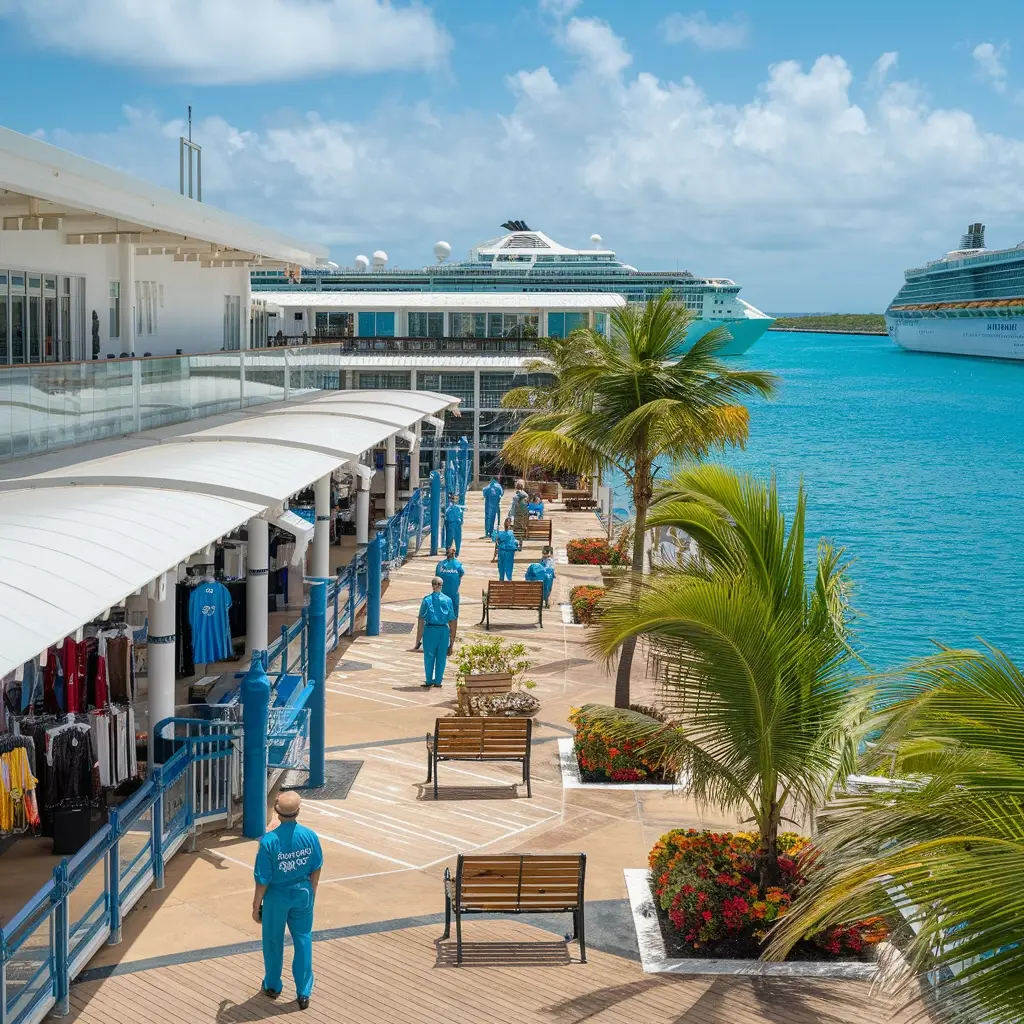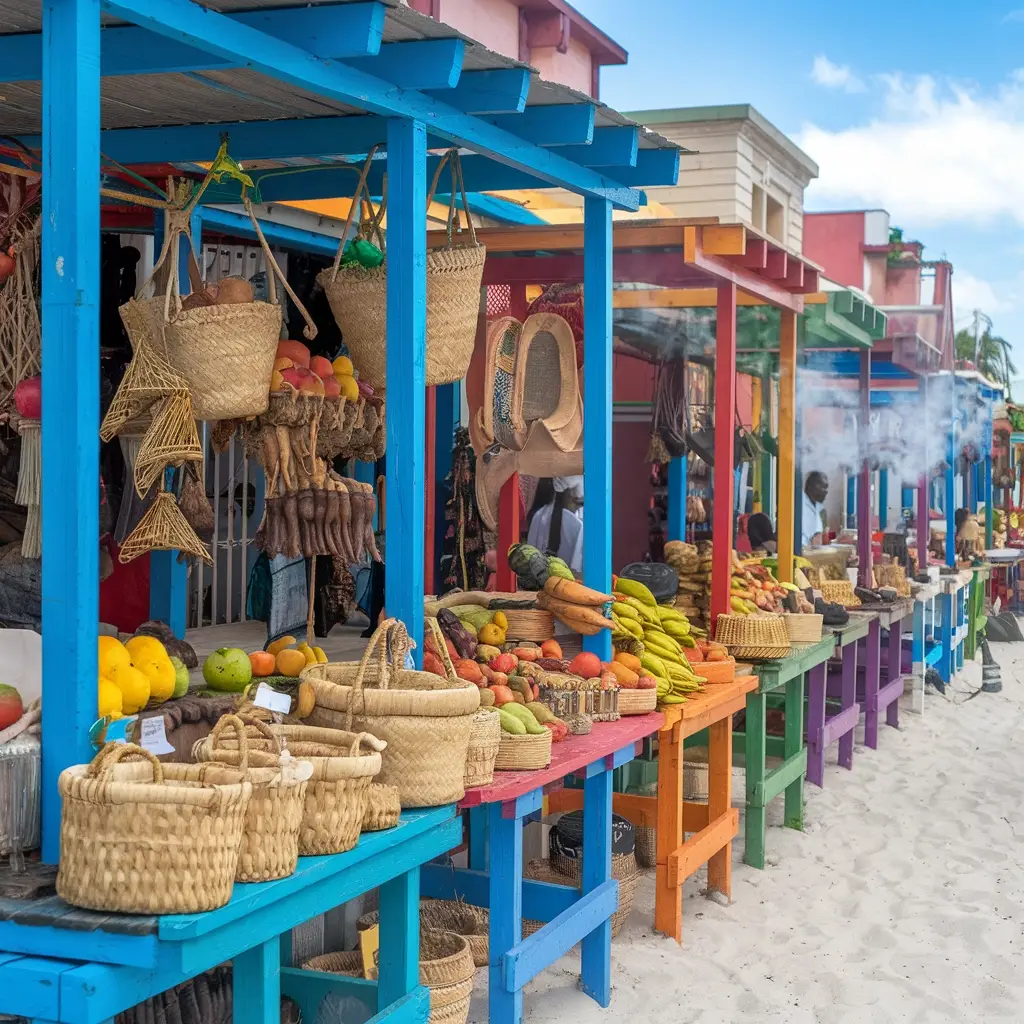You’ll find Falmouth’s cruise port blends modern facilities with traditional Georgian buildings. The terminal offers duty-free shopping, local craft markets and tourist information desks.
For other Greater Antilles cruise destinations check out our Greater Antilles Cruise Ship Ports Guide page.
From here, you can easily access popular attractions like Martha Brae River and Dunn’s River Falls.
The port’s layout connects directly to Falmouth’s historic centre. You can walk to most nearby attractions or find taxis and tour buses at the terminal. The organised setup helps you navigate between shops, restaurants and transport options.
Your journey through Jamaica starts here, with clear paths to both cultural sites and adventure activities. You can book excursions, exchange currency, and find local guides all within the port complex.
Key features:
- Duty-free shopping
- Local craft markets
- Tourist information
- Direct town access
- Transport connections
- Excursion booking
- Currency exchange
- Guide services
Map of Falmouth, Jamaica Cruise Ship Port
Getting Around the Port Complex & Terminal Facilities

You’ll find a clearly organised terminal complex at Falmouth’s cruise port. Signs point you directly to all facilities and services.
The main terminal building contains:
- Duty-free shops
- Local craft markets
- Tourist information desks
- Clean restrooms
- Air-conditioned waiting areas
- ATMs
A covered walkway links your ship to the terminal, keeping you protected from weather. You can find transport services right outside the main entrance:
- Licensed taxis
- Tour operators
- Bus services
All areas use clear signs and follow a simple layout, making it easy for you to move around the port complex.
Top Shore Excursions & Activities From Falmouth
You’ll discover a range of shore excursions in Falmouth that match your interests. Take a bamboo raft down the Martha Brae River or ride horses along the Caribbean coast for classic island experiences. If you seek adventure, you can zip-line across the rainforest or climb the famous Dunn’s River Falls. You can explore Falmouth’s Georgian buildings and the Rose Hall Great House on guided walking tours. Doctor’s Cave Beach in Montego Bay offers perfect swimming and sunbathing spots. For a taste of local culture, you can visit markets or join Jamaican cooking classes to learn traditional recipes.
Local Shopping, Dining & Cultural Highlights

You’ll find Falmouth’s local culture at its best in the town’s shops and restaurants. Market Street offers authentic Jamaican food, including jerk chicken and fresh seafood. The Falmouth Craft Market lets you buy handmade items and art directly from local makers.
The town centre features Georgian buildings housing boutique shops that sell Jamaican rum, coffee and spices. Water Square serves as a popular spot where you can eat traditional Jamaican patties and drink fresh coconut water. You’ll often hear steel drum music playing while you shop or dine.
Key spots for your visit:
- Market Street – Local restaurants and food stalls
- Falmouth Craft Market – Handmade crafts and artwork
- Water Square – Street food and drinks
- Town centre boutiques – Local produce and spirits
See what’s on offer from the Port of Ocho Rios, Jamaica for a different Greater Antilles cruise destination.
Essential Travel Tips & Port Information
Planning Your Falmouth Port Visit
You’ll find the modern cruise terminal offers three key features:
- Duty-free shops
- Tourist information desk
- Transport connections
Your ship will dock at one of three berths. You can reach the historic town centre with a 5-minute walk from your ship.
Port Operation Times:
- Opens: 7:00
- Closes: 18:00
- Peak season: December to April
Essential Items to Carry:
- Photo ID
- Ship card
- Money (Jamaican or US dollars)
Money Tips:
- Local currency: Jamaican dollar
- US dollars: Accepted at most places
- Keep small notes for local purchases
The port layout makes it easy for you to explore independently. You’ll spot clear signage from your ship to the town. The terminal building sits between your ship and the town centre, making it a useful reference point.
Frequently Asked Questions
What Is the Best Time of Year to Avoid Hurricane Season?
To avoid hurricane season, plan your visit between December and April. You’ll experience clear weather with average temperatures between 20-25°C and calm seas during these months. The winter and early spring period offers the most stable weather conditions for your travel plans.
Are There Any Local Festivals or Events Worth Planning a Trip Around?
Jamaica hosts three major festivals you can plan your trip around:
- Independence Day (August): Join street parades, food festivals and music events as locals celebrate Jamaican culture.
- Carnival (April): Experience colourful street parties, dance competitions and reggae concerts across the island.
- Bob Marley Week (February): Visit concerts, exhibitions and cultural shows honouring Jamaica’s most famous musician.
Each festival offers you authentic Jamaican experiences, from local cuisine to traditional music and dance performances. You can book accommodation early, as these events attract many visitors.
How Safe Is It to Explore Falmouth Independently at Night?
While Falmouth is generally safe, it’s safer not to walk alone at night. You should choose group tours or stay within the main tourist spots where streets are well-lit. If you want to explore after dark, you can join evening walking tours, use trusted local taxis, or visit the harbour area where restaurants and pubs remain busy. You’ll find plenty of CCTV cameras and regular police patrols in central areas.
What Vaccinations Are Recommended Before Visiting Falmouth, Jamaica?
You need these key vaccinations before visiting Falmouth, Jamaica:
- Hepatitis A
- Typhoid
- MMR (Measles, Mumps, Rubella)
- Tdap (Tetanus, Diphtheria, Pertussis)
You should ensure your routine vaccinations are current. Your doctor can advise you about malaria prevention tablets and any other specific requirements based on your health history.
Contact your GP at least 6-8 weeks before your trip to arrange these vaccinations.
Can I USe US Dollars, or Do I Need to Exchange for Local Currency?
Both US dollars and Jamaican dollars are accepted in tourist areas. You’ll find most hotels, restaurants and major shops accept USD. However, local markets, small shops and rural areas mainly use Jamaican dollars. For the best value, keep some local currency for small purchases and local vendors. Exchange rates at hotels tend to be less favourable than at banks or licensed exchange offices.
ATMs dispense Jamaican dollars, and you can spot exchange offices in tourist zones and airports. It’s smart to carry a mix of both currencies during your stay.
Thinking about something different? Check out the cruises leaving from Port Antonio, Jamaica Cruise Ship Port.
